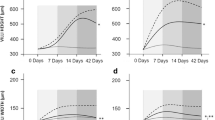Abstract
Postoperative ileus (POI) is a transient bowel dysmotility that occurs following many types of operations and is one of the most common complications of gastrointestinal surgery. We hypothesized that enteral supplementation of glutamine after abdominal surgery would restore fuel to the small intestine, suppress oxidative stress, and lead to improvement in POI. Twelve dogs underwent distal gastrectomy and were each randomly assigned to one of two groups based on postoperative treatment: the water injection (control) group and the glutamine injection group. Water (40 ml) or l(+)-glutamine (1 g/40 ml water) was injected into the residual stomach through the gastric tube every 12 h after surgery for 7 days. Changes in the plasma and intestinal intracellular concentration of glutamine and in gastrointestinal motility were measured. The plasma and intracellular glutamine levels decreased after the operation in both groups, although the decreased intracellular glutamine levels were not significantly different than preoperative levels. The glutamine group showed a significantly smaller decrease of the plasma glutamine level compared with the control group (P < 0.05). All the dogs showed gastrointestinal dysmotility after the operation. The mean length of time between the operation and the appearance of interdigestive migrating contractions in the glutamine group was significantly shorter than in the control group (22.4 ± 3.1 h versus 37.8 ± 4.0 h, respectively; P < 0.05). In conclusion, glutamine could act as a motility-recovery agent after abdominal surgery and thereby decrease the duration of POI.





Similar content being viewed by others
References
Bueno L, Ferre JP, Ruckebusch Y. Effects of anesthesia and surgical procedures on intestinal myoelectric activity in rats. Am J Dig Dis. 1978;23:690–695. doi:10.1007/BF01072353.
Livingston EH, Passaro EP Jr. Postoperative ileus. Dig Dis Sci. 1990;35(1):121–132. doi:10.1007/BF01537233.
De Winter BY, Boeckxstaens GE, De Man JG, Moreels TG, Herman AG, Pelckmans PA. Effect of adrenergic and nitrergic blockade on experimental ileus in rats. Br J Pharmacol. 1997;120:464–468. doi:10.1038/sj.bjp.0700913.
Kalff JC, Carlos TM, Schraut WH, Billiar TR, Simmons RL, Bauer AJ. Surgically induced leukocytic infiltrates within the rat intestinal muscularis mediate postoperative ileus. Gastroenterology. 1999;117:378–387. doi:10.1053/gast.1999.0029900378.
De Jonge WJ, Van Den Wijngaard RM, The FO, et al. Postoperative ileus is maintained by intestinal immune infiltrates that activate inhibitory neural pathways in mice. Gastroenterology. 2003;125:1137–1147. doi:10.1016/S0016-5085(03)01197-1.
Anup R, Aparna V, Pulimood A, Balasubramanian KA. Surgical stress and the small intestine: role of oxygen free radicals. Surgery. 1999;125(5):560–569.
Thomas S, Anup R, Susama P, Vidyasager S, Balasubramanian KA. Nitric oxide protects the intestine from the damage induced by laparotomy and gut manipulation. J Surg Res. 2001;99:25–32. doi:10.1006/jsre.2001.6101.
Parry-Billings M, Baigrie RJ, Lamont PM, Morris PJ, Newsholme EA. Effects of major and minor surgery on plasma glutamine and cytokine levels. Arch Surg. 1992;127:1237–1240.
Lacey JM, Wilmore DW. Is glutamine a conditionally essential amino acid? Nutr Rev. 1990;48:297–309.
Planas M, Schwartz S, Arbos MA, Farriol M. Plasma glutamine levels in septic patients. J Parenter Enteral Nutr. 1993;17:299–300. doi:10.1177/0148607193017003299.
Wernerman J, Hammarqvist F, Ali MR, Vinnars E. Glutamine and ornithine-alpha-ketoglutarate but not branched-chain amino acids reduce the loss of muscle glutamine after surgical trauma. Metabolism. 1989;38:63–66. doi:10.1016/0026-0495(89)90144-3.
Parry-Billings M, Evans J, Calder PC, Newsholme EA. Does glutamine contribute to immunosuppression after major burns? Lancet. 1990;336:523–525. doi:10.1016/0140-6736(90)92083-T.
Griffiths RD, Jones C, Palmer TE. Six-month outcome of critically ill patients given glutamine-supplemented parenteral nutrition. Nutrition. 1997;13(4):295–302.
Ziegler TR, Young LS, Benfell K, et al. Clinical and metabolic efficacy of glutamine-supplemented parenteral nutrition after bone marrow transplantation. A randomized, double-blind, controlled study. Ann Intern Med. 1992;116:821–828.
Engelen MP, Wouters EF, Deutz NE, Menheere PP, Schols AM. Factors contributing to alterations in skeletal muscle and plasma amino acid profiles in patients with chronic obstructive pulmonary disease. Am J Clin Nutr. 2000;72:1480–1487.
Souba WW, Smith RJ, Wilmore DW. Glutamine metabolism by the intestinal tract. J Parenter Enteral Nutr. 1985;9:608–617. doi:10.1177/0148607185009005608.
Souba WW, Klimberg VS, Plumley DA, et al. The role of glutamine in maintaining a healthy gut and supporting the metabolic response to injury and infection. J Surg Res. 1990;48:383–391. doi:10.1016/0022-4804(90)90080-L.
Rombeau JL. A review of the effects of glutamine-enriched diets on experimentally induced enterocolitis. J Parenter Enteral Nutr. 1990;14:100–105.
O’Dwyer ST, Smith RJ, Hwang TL, Wilmore DW. Maintenance of small bowel mucosa with glutamine-enriched parenteral nutrition. J Parenter Enteral Nutr. 1989;13:579–585. doi:10.1177/0148607189013006579.
Thomas S, Prabhu R, Balasubramanian KA. Surgical manipulation of the intestine and distant organ damage-protection by oral glutamine supplementation. Surgery. 2005;137:48–55. doi:10.1016/j.surg.2004.04.038.
Anup R, Susama P, Balasubramanian KA. Role of xanthine oxidase in small bowel mucosal dysfunction after surgical stress. Br J Surg. 2000;87:1094–1101. doi:10.1046/j.1365-2168.2000.01469.x.
Pinkus LM, Windmueller HG. Phosphate-dependent glutaminase of small intestine: localization and role in intestinal glutamine metabolism. Arch Biochem Biophys. 1977;182:506–517. doi:10.1016/0003-9861(77)90531-8.
Clark EC, Patel SD, Chadwick PR, Warhurst G, Curry A, Carlson GL. Glutamine deprivation facilitates tumour necrosis factor induced bacterial translocation in Caco-2 cells by depletion of enterocyte fuel substrate. Gut. 2003;52:224–230. doi:10.1136/gut.52.2.224.
Acknowledgments
The technical assistances of Ajinomoto Co. Ltd, Dr Hitoshi Kimura and Dr Takanori Inose are gratefully acknowledged. This study was supported in part by a Grant-in-Aid for Scientific Research and the 21st Century COE Program from the Ministry of Education, Culture, Sports, Science, and Technology of Japan (MEXT) and Initiatives for Attractive Education in Graduate Schools from MEXT.
Author information
Authors and Affiliations
Corresponding author
Rights and permissions
About this article
Cite this article
Ohno, T., Mochiki, E., Ando, H. et al. Glutamine Decreases the Duration of Postoperative Ileus After Abdominal Surgery: An Experimental Study of Conscious Dogs. Dig Dis Sci 54, 1208–1213 (2009). https://doi.org/10.1007/s10620-008-0478-5
Received:
Accepted:
Published:
Issue Date:
DOI: https://doi.org/10.1007/s10620-008-0478-5




